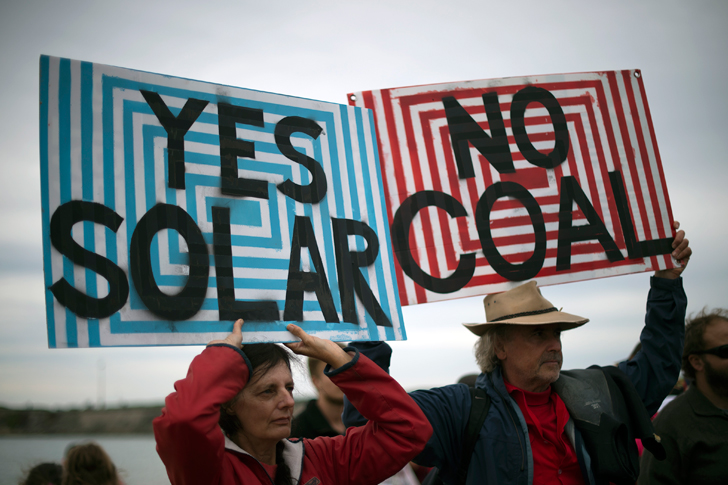The cost effect on the real world of the ideological fairyland of anti-coal campaigners is now becoming worryingly evident. Not that the financially comfortable, trendy inner-city, coal-bashing greenies who enjoy the benefits of a fossil-fueled society are likely to feel the pain that will, instead, hit those less able to take evasive action – such as lower income groups at home and those suffering energy-poverty abroad. The costs of clobbering coal and rushing into uneconomic, unreliable renewable alternatives are not simply in the sharply rising electricity bills of domestic consumers, or the corporate damage through unaffordable power price rises or industrial disruption and damage caused by an uncertain electricity supply – and putting thousands of jobs (such as at Alcoa aluminium) at risk. There is also the threat to Australia’s economic prosperity posed by political and activist opposition to the development of new export coal mines to meet rapidly rising Asian demand for lower-polluting Australian coal for power generation in modern low-emission plants. A major export earner at more than $40 billion a year, coal faces continual activist assault through ‘lawfare’ as in the multiple, unsuccessful court challenges that have added substantial costs in delaying for years the huge Carmichael mine proposed by India’s Adani group for the Central Queensland Galilee basin.
The domestic cost impact is evidenced by the escalating electricity bills already hitting Victorian and South Australian households and businesses well before the full effect of the cost of shutting down so much coal generation and over-reliance on renewables, flows through. According to the Australian Energy Market Commission, this will bring a ‘price surge during the next two years, largely driven by the close of coal-fired power stations in SA and Victoria and an ongoing investment in wind generation’. Those homeowners who can afford technologies like solar panels may avoid the full impact of unreliability and rising power prices. They only remain connected to the grid for back-up needs, so providing further upward pressure on prices. But those who cannot afford this infrastructure cost, or who are renters or live in apartments, have no escape. As the Australian noted, Labor’s traditional working class supporters will be bearing the brunt of the electricity price hikes and power failures, so worsening the inequitable impact of power price rises in states where Labor governments have excessively pushed renewable energy. The absurdity of states having various, higher renewable targets than the federal one severely diminishes the capacity of the Commonwealth’s Josh Frydenberg to achieve the stated objective of providing consumers with ‘access to reliable and affordable electricity’ while ensuring that meeting emissions reduction targets ‘cannot be at the expense of the lights going out and Australians not being able to afford their power bill’. But it is already happening – look at South Australia, where private enterprise is seeking to fill the gap with its own (gas-fired) power.
At least the Turnbull government is taking a positive stand against the continuing green attacks on the Indian Adani Group’s export-oriented governmentally-approved development of Australia’s biggest coal mine. Canberra’s $5 billion Northern Australian Infrastructure Facility is examining a proposal (supported by Queensland Labor but opposed by Shorten) to provide a $1 billion loan towards building a $2.5 billion railway from the Galilee basin to Abbott Point, capable of handling 40 million tons of coal a year, of which Adani will take 25. It is a condition of federal involvement that the remaining 15 million tons capacity be available to other potential miners. The government sees the development of the Galilee basin as having major economic benefits extending far beyond Adani’s tied exports to its Indian power generators. This offends the Greens ‘principles’; in seeking to prevent NAIF becoming ‘a $5 billion slush fund for polluting industries’, the Greens tried to exclude anything linked with fossil fuel. But Resources Minister Matt Canavan has countered this with the moral view that it would be hypocritical not to export coal to developing nations on the grounds that they ‘should not use fossil fuels to drive their economic growth…We can’t deny them the same resources we use to lead our relatively prosperous lives…that would be immoral’. Hear hear!
Got something to add? Join the discussion and comment below.
Get 10 issues for just $10
Subscribe to The Spectator Australia today for the next 10 magazine issues, plus full online access, for just $10.
You might disagree with half of it, but you’ll enjoy reading all of it. Try your first month for free, then just $2 a week for the remainder of your first year.














Comments
Don't miss out
Join the conversation with other Spectator Australia readers. Subscribe to leave a comment.
SUBSCRIBEAlready a subscriber? Log in